#Amateur built plane
Text
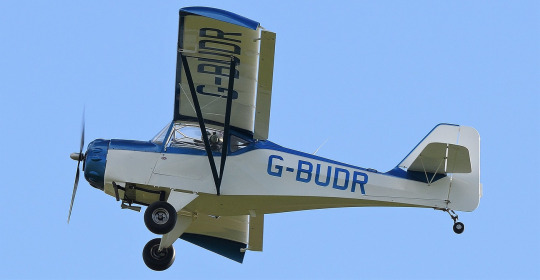
1992 Denney Kitfox Mk3 seen at the Duxford airshow
#Denney Kitfox Mk3#Kitplane#Home built aircraft#Kit airplane#Amateur built plane#Flying#general aviation
12 notes
·
View notes
Text
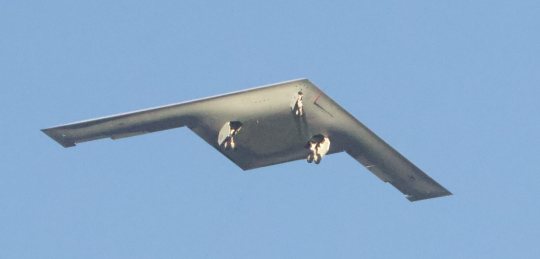
IMAGES: Fly the new USAF stealth bomber, the B-21 Raider
Fernando Valduga By Fernando Valduga 11/10/2023 - 15:14in Military
Photo: Matt Hartman
USAF's new B-21 “Raider” flying wing bomber made its first flight on Friday, the next step in the launch of a new fleet of nuclear-capable long-range stealth bombers built by Northrop Grumman.
The B-21 left the Northrop facility at U.S. Air Force Plant 42 in Palmdale, California, at sunrise on Friday at 6:51 a.m., offering the first improvised view of the new bomber that was developed under strict security.
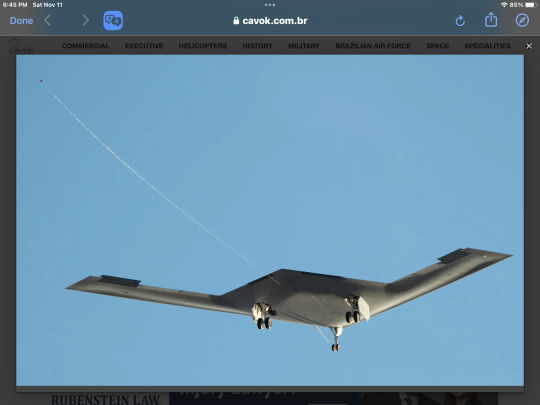
The aircraft went to Edwards Air Base, California, where it will continue with the flight test phase with USAF. The flight lasted about 90 minutes.
With the Cerberus callsign, the aircraft took off eastward with an F-16 companion plane after climbing about 500 feet. The landing gear was not collected, according to videos and photos that appeared on social networks.
TAP TITLE BAR TO VIEW VIDEO☝️
U.S. Air Force leaders did not disclose the first flight of the B-21, but about three dozen aviation enthusiasts and amateur photographers gathered around Plant 42 on Friday in the hope of seeing the bomber rise to the skies.

Photo: Mike Henry
The B-21, which carries the same "flying wing" format as its predecessor, the B-2, will be able to launch conventional and nuclear weapons around the world, using long-range and in-flight refueling capabilities.
The aircraft are projected to cost approximately $550 million each in 2010 dollars, or about $750 million in current inflation-adjusted dollars. However, the USAF kept other price information confidential, “which makes it difficult to validate the proposed cost,” the Congressional Research Service said in a 2021 report.
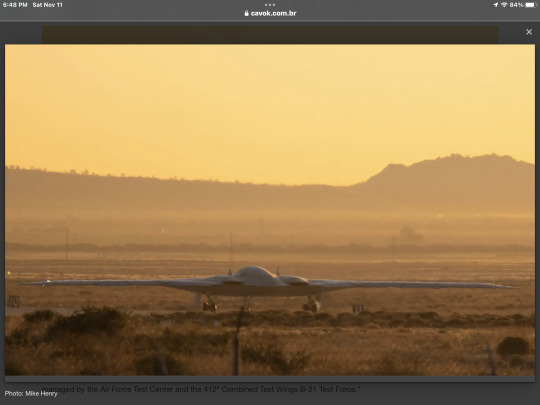
Photo: Mike Henry
The U.S. Air Force plans to buy at least 100 planes and start replacing the B-1 and B-2 bombers. The B-1 costs about US$ 60,000 per hour to operate and the B-2 costs about US$ 65,000 per hour, according to Pentagon data.
Ann Stefanek, USAF spokesperson, said: “The B-21 Raider is in flight tests. Flight tests are a critical step in the testing campaign managed by the Air Force Test Center and the 412ª Combined Test Wings B-21 Test Force."
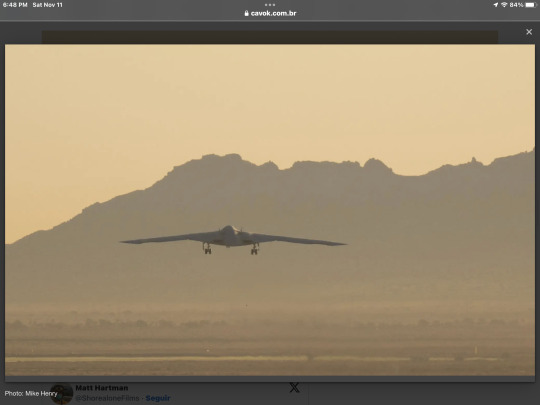
Photo: Mike Henry
Six test aircraft are being produced now. They are being built on the same line, using the tools, processes and technicians that will build the production aircraft.

Northrop defeated a team composed of Boeing and Lockheed Martin when it won the 2015 contract to manufacture the bomber. Engine manufacturer Pratt & Whitney, Collins Aerospace, GKN Aerospace, BAE Systems and Spirit Aerosystems are among more than 400 suppliers in 40 states.
The B-21 was publicly presented in December 2022, but the expectation around its first flight had been growing for years.
In 2019, an important Air Force general suggested that the bomber could fly as early as December 2021, but the Force subsequently postponed this date to mid-2022. In early 2022, the USAF postponed even more until 2023.
The B-21 program is in the engineering and manufacturing development phase and the first aircraft will be delivered to Ellsworth Air Force Base in North Dakota.
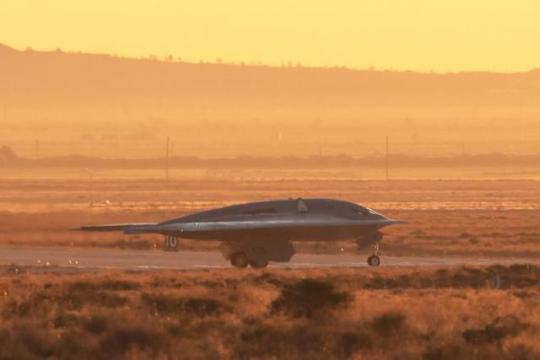
Northrop is calling the plane a sixth-generation aircraft due to its ability to connect to other aircraft and easily integrate future weapons into its systems architecture.

The B-21 also features surface material with low observation, more durable and stealthy, which should require less maintenance and reduce operating costs and downtime.
Tags: Military AviationNorthrop Grumman B-21 RaiderUSAF - United States Air Force / U.S. Air Force
Sharing
tweet
Fernando Valduga
Fernando Valduga
Aviation photographer and pilot since 1992, has participated in several events and air operations, such as Cruzex, AirVenture, Dayton Airshow and FIDAE. He has work published in specialized aviation magazines in Brazil and abroad. Uses Canon equipment during his photographic work in the world of aviation.
Related news
SAAB
Sweden will arm Gripen E fighters with anti-radar missiles
10/11/2023 - 18:00
DUBAI AIR SHOW
Russia will show the Il-76MD-90A and a line of civilian and combat helicopters at the Dubai Airshow
10/11/2023 - 17:00
MILITARY
Slovakia cancels military aid package to Ukraine
10/11/2023 - 14:00
MILITARY
Saab highlights Gripen E at a defense fair in Thailand
10/11/2023 - 09:00
The first Boeing T-7A Red Hawk, with the USAF test pilot Maj. Jonathan "Gremlin" Aronoff and Boeing test pilot Steve "Bull" Schmidt at the controls, arrive at Edwards Air Base on November 8, 2023 (Photo: U.S. Air Force / Todd Schannuth)
MILITARY
IMAGES: First T-7A Red Hawk arrives in Edwards to start the testing campaign with USAF
10/11/2023 - 08:10
MILITARY
Spain 'rejects' F-35 fighters and should focus on more Eurofighter Typhoons
09/11/2023 - 21:52
Client PortalClient PortalClient PortalClient PortalClient PortalClient PortalClient PortalClient PortalhomeMain PageEditorialsINFORMATIONeventsCooperateSpecialitiesadvertiseabout
Cavok Brazil - Digital Tchê Web Creation
Commercial
Executive
Helicopters
HISTORY
Military
Brazilian Air Force
Space
Specialities
Cavok Brazil - Digital Tchê Web Creation
26 notes
·
View notes
Text

Female Reader x Rooster
Time: Post-Top gun: Maverick
Y/n Blackwood - L/n, daughter of Charlotte "Charlie" Blackwood. Y/n took a strong interest in planes from a young age. Knowing her father was an esteemed pilot drew her even further into the navy. Quickly, she became one of the best solo pilots and graduating at the top of her class at Top Gun.
Her next mission? Return to Top Gun, Face certain death, romantic interests, and finally, her thought-to-be-dead, father.
This book contains strong language and sexual content that may be sensitive readers under the age of 18
This story was originally posted on Wattpad, follow me on there for faster updates. I have published a non-binary version of this story published there for those who do not identify as female or use she/her pronouns. It will follow the exact same story line.
Link to Wattpad Account
Link to the Non-Binary version
Master list

You Will Know
Today was the day. It was me versus the tarmac and the sky's above me. Hangman had taken to the sky's before me, waiting to begin our lessons for the day.
I looked out onto the open runway, my breathing beginning to quicken as my anxiety began to heighten. I snapped on the oxygen mask which helped, but I could still hear my heartbeat in my ears. It felt like my body was made of stone. No matter how much I willed my hand to push forward on the throttle it didn't happen.
I closed my eyes tightly and took a deep breath in through my nose and out through my mouth.
"Talk to me mom." I whispered. Usually, it gave me a boost of confidence. Sometimes it felt like she was actually there, willing the stick for me.
That didn't happen this time. My brain wandered to the conversation I had with Bradley the night I came home from the hospital.
"You will know. You'll feel it... You will be ready in your own time, in your own way. But whenever you are, you'll know."
I opened my eyes at the feeling of the plane moving forward. I looked down and saw my hand slowly pushing forward. Confidence built up in my chest, bringing a smirk to my face. I punched the plane forward (faster than I should have) and lifted off into the sky.
I rapidly approached Hangmans plane. I slowly down as I approached, gliding next to him now. He looked over at me, a grin forming on his face.
"It's good to see you back in the air."
"It's good to be back. Now let's put these amateurs in their place, shall we?"
Hangman smirked and then put on his oxygen mask. "Wolf is back."
To my luck, the first teams in the sky had Ghost on it. I smirked to myself, now excited to enact my revenge. Hangman and I flew low, undetectable by their radars.
'Where are they?' Ghost asked in the mic.
'They're not on the radar, they're probably below us.' Denali responded.
Hangman gestured for me to initiate the attack. I looked up at the two younger pilots above me and punched my plane up. I coordinated my entrance to slip in between the gap between their planes. Both sets of pilots yelled out in surprise as their planes were pushed sideways by the force of mine.
"Fights on!" I yelled. I pulled my plane to a halt, catching hang-time as I rotated around. I punched the plane forward to chase. I singled out Ghost, coming after him fast and hard.
'Shit, wolf is on me!' Ghost yelled to his wingman for help.
"I thought you weren't scared of me?" I taunted him while smirking. I stayed on his tail as close as I could while still maintaining the required safety limit. I anticipated his every turn, flying ice cold.
He kept yelling for his friends to help him but they were having trouble shaking Hangman off their tail. A moment of weakness was the downfall of the young pilot. He turned his plane to the side to go and try to help Denali and Haywire. I moved the throttle over and found missile lock on Ghosts' plane.
"Ghost is down."
"Copy kill!" He said angrily into the headset. I glided my plane beside his to catch his attention. I did a two finger salute to him before taking off.
Shortly after I had downed Ghost, Hangman had gotten the other foxtrot team. I met with hangman and glided our planes next to each other.
"You've still got it." He complimented.
"Never left in the first place." I responded.
The rest of the sessions went well. I hadn't realized how quickly time passed. Flying again felt good, refreshing. Hangman and I landed our planes and made our way back into the hanger.
I went right to my office to write down and try to remember any advice I had for the pilots or maybe some exercises to do tomorrow. I opened the door with my name on it and I smiled at the small space. This was the same temporary office that Pete occupied when we found out he was my father. Truthfully, it had become one of my most fondest memories.
I sat down in the rolling chair behind the desk, jotting abbreviated notes down on a notepad to add to my computer later.
A knock at my door interrupted me from my thoughts and I looked up. Through the window I could see the familiar dark haired student.
"Come in." I responded dryly. The door creaked open and then slowly shut behind Ghost after he entered the room. He saluted to me, standing at attention. I'll admit, it was a nice change to have someone doing it to you.
"At ease." I instructed.
Ghost relaxed his shoulders and let out a breath of air. I put down my pen and folded my arms across the top of the desk. I gave the pilot a small smile to show him I was ready to listen.
"I want to apologize about my behavior before Mrs. Blackwood."
"Miss," I corrected. "But go on."
"Oh," he responded, seeming almost surprised by what I had said. "Miss? I heard you were married?"
I shook my head gently. "No, I am not." I wondered where he heard a crazy rumor like that.
Ghost sat down in the chair across from my desk, Avoiding my eye contact.
"I assumed it was Hangman." It seemed like ghost was trying to strike up a friendly conversation. Which I appreciated, but I knew it was not the real reason he was here.
I scoffed and then laughed. "Absolutely not. We're great friends though. Why did you want to see me?" I tried to get the conversation back on track.
"Right.. I'm sorry for doubting your abilities."
I narrowed my eyes at Ghost as he sat there twirling his thumbs and avoiding my eye contact.
"Did hangman talk to you?" I asked. There was a moment of silence between us before Ghost sighed and shook his head.
"Yeah." He finally admitted.
"I figured. You don't seem like the type of guy to apologize for that. Nonetheless, I accept your apology. You're dismissed." I waved my hand towards the door in gesture for him to leave.
"What's that supposed to mean?" Ghost asked, sounding more offended now. I sighed, now attempting to mansplain myself to him.
"You truly believe that you're better than everyone else here. Even if that means tearing others down to make yourself feel better."
"I am better." Ghost challenged.
"Is that why you got shot down in less than 5 minutes?" I asked. I admit, this wasn't how a teacher should act. But it sure was fun pushing his buttons.
Ghost slammed his hands on my desk and stood up, looking at me with an unbridled rage in his eyes.
I narrowed my eyebrow at him daringly.
"Your next decision determines whether you continue your training here at TopGun or if you're kicked out of the program. Choose wisely."
We stared coldly into each others eyes. His filled with rage and mine filled with calm. Almost like a raging forest fire and a calming ocean beach.
Ghost grunted in frustration and turned on his heel towards the door. He slammed it behind him which honestly made me jump.
I huffed a breath of relief out from my mouth at the fact that he was gone. Ghost had a screw loose, maybe a couple. When he was angry and he was dangerous. I jotted that down in my notes. If he learned to control his actions, that might help his flying.
I heard another knock at the door, this time it swung open without me giving permission. If it weren't Maverick, I would have been upset.
"Pissing off your students already?" He hummed a chuckle as he walked to the chair across from me and plopped down.
"I guess so. He's got a large ego with nothing to back it up." I admitted in frustration to my father.
"They're naval pilots, they all have a large ego." We both laughed and shook our heads at his comment. Suddenly his face changed. It fell slightly and he looked down at the floor at his feet.
"Brad called me last night."
I felt my heart drop to my stomach. I dropped what I was doing and looked up at Maverick. He looked at me through his brow, as though he was waiting for me to react.
"He called you?" I asked, taking out my phone and opening my call log. There were no missed messages from him. I looked back up at Maverick, feeling frantic now. I wanted to ask a million questions but my voice wouldn't cooperate.
"Yes. He called really late last night after you went to sleep. Said he didn't want to wake you because he knew you had training. He just wanted to let us know he was okay."
"Do you know why he hasn't called before?" I asked.
Maverick sucked his teeth in thought and looked around the room.
"Something about not being allowed to have his phone? Or he didn't have it? I don't remember. He called me on a pay phone."
I let his words settle in my brain for a moment. I don't know what I was feeling. Relief? Anxiety? Anger? Maybe all of the above. The overwhelming rush of emotions brought tears to my eyes which made me even more mad. I sniffled my nose and dropped my head into my hands.
"Y/n," Maverick sighed. He walked around the table and pulled my head against him and hugged me gently.
I angrily wiped the few tears off my face and huffed out air. "I don't know why I am crying. It's just stupid. It's all so stupid."
Maverick chuckled and brought his hand up to my hair, smoothing it down and petting it gently.
"Boys are stupid." He agreed.
"Why didn't he call me? He's not answered me for four days!" I lashed out a little, starting to feel my anger more predominately than any other emotions. "I don't even know why I care. I shouldn't care."
"Hey," Maverick scolded me. He moved around so that he was leaning on my desk. I looked up at him as he talked. "You do care because you care about him. And I assure you Bradley cares."
I scoffed and rolled my eyes. "Not enough to call me apparently."
"You want to know what he told me?"
"What's that?"
"The night we sat down to talk about your relationship and the future, he pulled me aside. He looked me in the eyes and with all seriousness he said, 'Mav, I want to marry her.'"
I stared up at him, too stunned to speak.
"He told me he wasn't at the age where he wanted to date someone for the fun of it, because something might happen. He told me he's never been more sure of anything in his life. I've known that kid for a long time and I can say I have never seen him so head over heels for somebody."
I could feel my heart swell and an inevitable smile crept into my face. Emotions welled up my throat and threatened to spill out of my eyes more. It was hard to believe anybody had felt that way about me. I tended to push people away with my short temper and crude mouth. Because I wasn't dainty and girly guys never took an interest. Finally, I had drawn one in.
"Thank you Pete. For telling me."
I stood up and we embraced each other in a hug.
"Any time I'm here for you." He comforted me, placing a hand on the back of my head and giving me a tight squeeze before he pulled back.
"Now tell me all about these pilots."
Next Chapter
#top gun smut#top gun movie#top gun fic#top gun fanfiction#bradley bradshaw smut#bradley bradshaw#rooster bradshaw fic#rooster bradshaw#rooster x y/n#rooster x reader#rooster fanfic#pete mitchell#fanboy top gun#hangman top gun#jake seresin#bradley rooster bradshaw#bradley bradshaw fluff#bradley bradshaw fic#bradley bradshaw fanfiction#bradley bradshaw angst#bradley bradshaw x y/n#bradley bradshaw x oc#bradley bradshaw x reader#bradley bradshaw x female reader#bradley bradhsaw x you#bradley bradshaw fanfic#top gun rooster#rooster top gun#bradley bradshaw imagine#bradley bradshaw drabble
40 notes
·
View notes
Note
Hi Asbjrna,
First, I love your photography. As an amateur wildlife photographer, I am always curious to know what draws people like yourself to photograph the things they do. In your case, you seem to love all forms of Transportation. What started your interest in trains, planes and automobiles?
Jonathan
Excellent question!
My interest began at home, my grandmother grew up in a town in the Chilean pampa called Zapiga. The town existed only because of the Nitrate Railways Co Ltd, and was built up around the railway station. Growing up I'd hear stories of how she'd watch the train go by from her house, and how every week on Thursday the train would lay up in the yard overnight. Stories like that were more than enough to get me into railways.
In primary school I met a kid who was really into aviation, we became friends and eventually I got sucked into it as well. Although I don't do too much av-spotting I still have friends in the community.
Buses and trams happened at the same time just 2 years ago in 2021, I met a guy working at Dockline Tramway, we became friends, I joined MoTaT (Museum of Transport and Technology) and now I spend most of my free time bus spotting.
Basically it's the social aspect that got me hooked, and the fact that I can be a history nerd with transport as well.
2 notes
·
View notes
Text
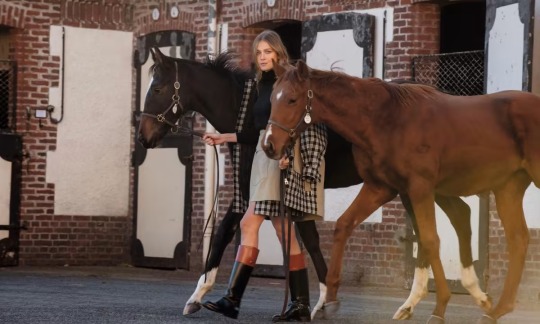
Inés Laffón, the most unknown WAG of Real Madrid.
“What I love most about Álvaro is his humility, his loyalty and, above all, his nobility with his people. We live a very quiet life surrounded by our family and friends like anyone else.”
Six kilometers from the cinematographic city of Deauville and very close to the beaches where the historic Normandy landings took place is the "Haras du Quesnay". This magnificent 180-hectare estate is famous for one of the most prestigious Thoroughbred stud farms in the world and a castle that has nothing to envy to those from fairy tales. The castle and everything that surrounds it was built in 1907 by William Kissam Vanderbilt, an American investor who wanted to establish a stud farm in France. After his death in 1920, another American, Arthur Kingsley Macomber, resumed the task, which in 1958 passed to the ancestors of our hostess: Inés Laffón. Inés was born and raised in France and currently lives in Madrid with her life partner, Álvaro Odriozola, a Real Madrid defender. The footballer from San Sebastian is also passionate about racehorses, in fact he owns the horse Cuadra Bernardo, which he named after his late grandfather, from whom he inherited his love for horses.
Inés belongs to a well-known Sevillian family — she is the first cousin of Rocío Laffón, "Rochi", very popular for her friendship with Victoria de Marichalar. "I have a very peculiar mix of nationalities. My father's (Carlos Laffón Parias) family is from Seville, but he grew up in Madrid. My mother, Patricia Lomba Head, was also born in Madrid: her father is from Madrid, but her mother is French. The funny thing is that my great-grandfather is English and my great-grandmother is Belgian" - tells us the young woman, linked to the equestrian world also by both branches of her family. "The world of horses brought my parents together. My father always wanted to be a horse trainer and started as a "gentleman rider" (amateur horse racer) in Madrid where he met my mother. Fortunately, my grandmother, the first horse trainer, lived in France and gave him the opportunity to work with her to learn the trade. That's how my father became a coach in Paris and from that union me and my siblings were born".
Inés, since when has this property belonged to your family?
My great-grandfather Alec Head, his brother and father bought Quesnay in 1958 after the war. His father, when he saw the size and reconstruction that the war required, told him it was madness and that it would ruin them. But, after a year of works, conditioning, good investment and, above all, the talent of my great-grandfather, in 1959, they brought the first stallion to the farm. My great-grandfather had a vision and pioneered the purchase of American blood at horse auctions in the United States - he is considered one of the greatest French breeders of all time. He created a cabalistic empire out of nothing thanks to his talent, vision, and connection to racehorses.
You mentioned World War II. How did occupancy affect the property?
Deauville is very close to the beaches where, almost at the end of the Second World War, the famous landing in Normandy took place, and the stud farm played a very important role in the conflict, as it became the hideout of the Nazi high command. The German army took the castle and it was the headquarters of the 711th Infantry Division, commanded by Lieutenant General Josef Reichert and General Erwin Rommel. They painted it green and conveniently camouflaged it so it wouldn't be seen by planes. The one hundred and ten "boxes" currently housing broodmares and newborn foals were cells for Nazi prisoners during the war.
It makes a huge impression.
Yes, my great-grandfather and his family traded blueprints, guns, and helmets for books, sales catalogs, and whatever else it takes to grow a racehorse.
What memories do you have of your childhood here?
It's a very special place because my family lives all over the world and "Quesnay" has always been where my great-grandparents used to gather us all to spend our holidays together. The best part was getting on my great-grandfather's tractor and driving from meadow to meadow, watching horses and cows and listening to him talk about them with such passion. Besides, all my cousins and I rode ponies and ran all over the stud, trotting and galloping non-stop. Those are priceless memories and it's something I'll never forget.
Do you often come to this house?
When I lived in France, I often came here on weekends, and between July and October we spent longer periods here. When I moved to Madrid, I came a little less often, but now that my boyfriend shares my passion for horses, we try to come whenever he has a few days off.
I imagine Álvaro is always happy to come with you to this place.
Álvaro has a great passion and love for horses that is very difficult to explain. He is in love with the horse as an animal and racing in particular. When he comes here, he says he's coming to Disneyland Horse... Imagine how much this place means to us, it's just magical. Here all the pressure he has during the season disappears and we gain a lot of strength.
How did you meet? Like your parents, did the horse world connect you both?
Our story is peculiar and very funny. As Álvaro is passionate about horse racing, he spends most of his free time traveling and watching races in France, England and Ireland. Every year, on the first weekend of October, Paris hosts the most important race in the world - the Arc de Triomphe Prize, bringing together the best thoroughbreds in the world. And of course, how could it be otherwise, Álvaro was there with his family and I was there because usually my father always has one or two runners a day. Apparently, Álvaro noticed me that day, and it so happened that the day after the incident, Álvaro went to visit my father's stables in Chantilly with a mutual friend. Realizing that I was working in Madrid, two days later they organized a dinner where I met Álvaro for the first time. I didn't even know who he was, but blessed passion for horses that brought us together!
Do you like football? Are you a fan of any team?
The truth is that before I met Alvaro, I knew absolutely nothing about football, but living with him every day, I liked it and learned more and more until I realized that it is a great sport. I've really liked every club Álvaro has been to in recent years: Real Madrid, Bayern Munich and Fiorentina, and I'm a fan of the team he's at.
As you say, last year in Florence, now in Madrid, next year, who knows... Does your job allow you to follow Álvaro wherever football takes him?
Since I met Álvaro, we have lived in Munich, Florence and Madrid. I was able to go to Munich because it was the beginning of the pandemic and the offices were closed. The result was an online job that allowed me to follow him everywhere, returning to Madrid from time to time to fulfill my professional commitments. Living abroad is a very enriching aspect of football: it brings us together and allows us to meet great people.
What is your favorite area of the castle?
My favorite part of the house is the living room. There is nothing I like more than a family evening or playing cards after dinner by the firelight. It is also the place where my great-grandfather and then my grandmother prepared crossbreeds, which stallion to combine with which mare to try to breed the fastest horse... It was very interesting for us to listen to them. From the outside, I run a stable where the mothers of the mares and their foals stay, I love to walk there and bring carrots to the foals. But if I had to choose a place from the entire stud, I would choose the little chapel, which is located at the end of the garden and is unique for the whole family.
What is your favorite plan when you are here?
Meeting the family, having a good conversation by the fire, running in the morning in the meadows, playing cards... But without a doubt my favorite, if I'm here during the birthing season, which is from January to May, is to see the birth of a foal with the hope that it will be a champion. The first hours of a horse's life seem amazing to me.
What are the must-see places in this area of France for you?
Deauville is a very charming city where I love to walk. During the film festival, along the endless beach there are booths with the names of all the actors, which is very original. Twenty minutes away is Honfleur, a seaside town with a very interesting historical and artistic heritage that inspired Monet and Courbet, among others. And of course flower market. Landing beaches, memorials and American cemeteries are also worth seeing.
Tell us about yourself, what do you do?
As I mentioned, I was born and raised in France, but I always wanted to go to Spain, so after finishing my studies I was looking for a job in Madrid and for seven years I have been working at BDO, in "financial consulting", and more specifically in business valuation.
Apart from horses, what are your hobbies?
I love spending time with my family and with Álvaro. I like traveling, getting to know different places and cultures, it enriches me a lot. Since I was little I loved watching people cook at home and now I really enjoy cooking and hosting people at home. I love jewelry and have always wanted to do a gemology course. This will be my next hobby!
Are you very close to your cousin Rocío?
We are like sisters. Although I lived in France, we always spent a lot of time together and since I came to Madrid we do everything together. We have many things in common, we know each other very well, we love traveling and horses. Rochi is pure energy and joy and I count on her in everything.
Another great horsewoman is Victoria de Marichalar, a close friend of your cousin. Did she ever have the opportunity to accompany you to the castle?
Victoria is like part of the family. We take many trips together and we love escaping to this house. Although hers was jumping, she loves the world of horse racing and, whether in Madrid or Paris, we really enjoy the equestrian plans.
What is it like to share your life with a football star?
I love being able to be by his side while he fulfills dreams. Living from your passion is a great luck and Álvaro has worked a lot to get where he is. On the one hand, it’s a dream life, but on the other, it also entails many sacrifices, both on his part and on mine. From one day to the next you can go to another country, there are no weekends or holidays... but Álvaro makes everything much easier. What I love most about him is his humility, his loyalty and, above all, his nobility with his people. We live a very quiet life surrounded by our family and friends like anyone else.
Would it be a dream for you to get married in this castle?
Of course. This house is the realization of my great-grandfather's vision, where my grandparents and my parents got married. This is my place of peace and happiness with Álvaro. Getting married here would be a dream.
12 notes
·
View notes
Text
The Curious (And Explosive) History Of Cincinnati’s First Steam Fire Engine
Cincinnati’s wonderful Fire Museum on Court Street continually burnishes our city’s two fire-fighting claims to fame: Cincinnati created the first professional fire department in the United States in 1853, and Cincinnati craftsmen invented the first successful steam-powered fire engine in 1852. Those two facts are inextricably connected and they are even mostly true, although they do not tell the whole story.
Usually missing from Cincinnati’s fire-fighting history are a few additional facts that provide clearer context:
Cincinnati had to pay its firefighters to haul the new fire engine to fires because amateurs refused to operate the contraption.
Cincinnati’s steam fire engine was not the first; other inventors had produced steam-powered fire engines decades earlier.
Cincinnati’s first steam-powered fire engine exploded during a public demonstration, killing the operator.
Although Cincinnati created the first professional fire department in 1853, the impetus for this innovation can be traced to a riot between two companies of firefighters in 1851. For decades, Cincinnati’s fire protection had been provided by a couple dozen amateur associations. Whatever company showed up first and extinguished the fire got paid by the insurance company that provided coverage for that particular building. If two or more companies appeared simultaneously, brawls erupted to determine who would get paid. The 1895 “History of the Cincinnati Fire Department describes an all-too-common scene:
“One of the fiercest contests occurred in the year 1851. The battle took place during a fire on the corner of Augusta and John streets, between Western Hose Company No. 3, and the Washington Company No. 1. On that occasion ten companies were drawn into the fight, while the building, a planing mill, was permitted to burn to the ground. Mayor [Mark P.] Taylor appeared on the scene and read the riot act, but to no purpose, the battle continuing until daylight.”
Eager as they were to pound one another into the pavement, Cincinnati’s volunteer fire-fighters wanted nothing to do with this steam engine, which could certainly out-perform any of their old-fashioned hand pumpers. William T. King, in his 1896 “History of the American Steam Fire Engine” explains why:
“As the time approached for the trial of the engine, the volunteer firemen were in a ferment. It would never do to destroy the engine before it had had a trial; and to destroy it after a successful exhibit of its powers was made, would be equally useless. So it was understood that no demonstration, pro or con, would be made on it until it should come to a fire, when it was to be rendered useless and all who had a hand in its working were to be rendered useless also.”
A source described only as “an old-time visitor to Cincinnati” related how he was drafted into driving the first steam engine to a fire because none of the volunteer firemen would go near it.
“We were on our way to church Sunday morning when the fire bells struck, and my brother said: ‘Now we’ll see what they will do with the steam machine,’ and we started for Miles Greenwood’s shop, where the steam fire engine was. It was built by Greenwood, the first ever on wheels. There the engine stood, steam up, four large gray horses hitched to it, a crowd looking at it, and Greenwood as mad as the devil because he couldn’t get a man to drive the horses. You see all the firemen were opposed to this new invention because they believed it would spoil their fun, and nobody wanted to be stoned by them, and then, the horses were kicking about so that everybody was afraid on that account. My brother says: 'Larry, you can drive those horses, I know.’ And Greenwood said: ‘If you can I wish you would; I’ll pay you for it.’ My business was teaming, you see. And just as I was with my Sunday clothes on, I jumped on the back of a wheel horse, seized the rein, spoke to the horses, and out we went kiting.”
The steam engine in that anecdote was, most likely, the first practical steam-powered fire engine developed by Alexander Bonner “Moses” Latta and Abel Shawk. Their first functional machine was christened the “Uncle Joe Ross” after the city councilman who introduced legislation to buy the engine for the city. Latta and Shawk were probably aware that other inventors had built steam fire engines in New York and Berlin. Those predecessors proved impracticable, however, because they took too long to build up enough steam to pump water. Latta and Shawk built a machine that could go from ignition to full steam in a little over five minutes, meaning the engine was usually ready to pump by the time it arrived at the fire.
Cincinnati’s innovative professional fire department and high-tech steam engines attracted visitors from all over the country. On 5 December 1855, a delegation from Chicago traveled to the Queen City to study how this new-fangled system worked in practice. To show off the new toys, a pumping demonstration was arranged that afternoon at the intersection of Sixth and Vine, with two pumpers, the Uncle Joe Ross and the A.B. Latta, named for its inventor.

The Latta showed up first, under the supervision of Mr. Latta himself, but took an unusually long time – almost 12 minutes – to get up a good head of steam. As it was puffing along, the Uncle Joe Ross pulled into the intersection, operated by British-born and high-strung John Winterbottom, who decided to prove he knew more about steam than the celebrated inventor himself. In just seven minutes, the Uncle Joe Ross built enough steam to throw two streams of water hundreds of feet in the air.
Latta told Winterbottom that his engine did not have enough water in the boiler. Winterbottom responded with a suggestion that Latta perform an anatomically impossible act. Just as Winterbottom’s engine reached a peak pressure of 180 pounds per square inch – normal operating pressure was just 60 psi – the hose on Latta’s engine ruptured and the crowd lurched backward. This retreat saved several lives because, at that moment, the Uncle Joe Ross exploded, spraying steam and shrapnel. According to the Cincinnati Railroad Record [13 December 1855]:
“The engineer, John Winterbottom, was blown into the air a considerable height, and fell some fifty yards from the engine. His legs were blown from the body, the entrails of which were torn out, and when picked up, nothing but the trunk and head remained. It was a sickening sight, and will not be readily forgotten by those who witnessed it.”
Despite the potential for accidents, steam-powered fire engines remained the standard for fire departments throughout the United States for the next 60 years. The company founded by Latta and Shawk evolved, over the years, into the Ahrens-Fox Company, producers of vehicles long considered the pinnacle of classic fire engines.
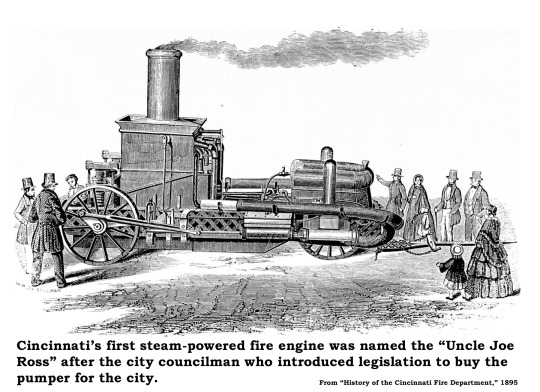
8 notes
·
View notes
Text
Plane’s engine ‘went silent’ moments before deadly Mulberry crash
Officials are giving more details about a plane crash in Mulberry that killed a 76-year-old pilot earlier this month.
According to a preliminary report by the National Transportation Safety Board (NTSB), a man who lives along the runway of the South Lakeland Airport in Mulberry said at first nothing seemed unusual when he saw an experimental amateur-built Merlin Lite motor glider taxi toward the…
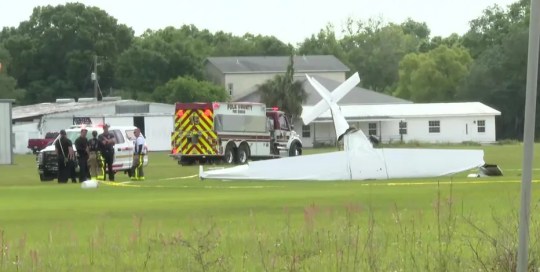
View On WordPress
0 notes
Text
Incipit: Originally, I made these posts as an exercise in botching. That is to say, trying to get these concepts across briefly and with minimal effort rather than obsessively retouching every minute detail. But considering the last one had the entire Personality section be the tragic backstory from childhood to adulthood of an edgy Mass-Murderer/Mercenary, i'm fairly confident i failed at achieving simplicity. But in the wise words of Michael Guy Bowman: "I'm never gonna stop / Never gonna stall / Never see me drop / Never see me fall / […] I'm never gonna break / Never gonna lose / Never gonna lose, never gonna lose / Never gonna lose, never gonna lose / Never gonna lose, never gonna lose". Thank you Michael. Truly you are a lyrical genius.

5th Post: Scorpine, the Sign of the Wily. desu-ne~.
Constellation: Well, it looks like a windmill doesn't it~? You have the four windmill flap thingies and then the tilde (~) is a gust of air pushing it to turn. But then why is it a Light sign? If it's pushed by Air then it should be a Breath sign, and if it mills grain that's food, a Life sign. What aspect of a Windmill is Wily? Here's what i think. The windmill is a human construct, it's a machine made through knowledge to harness nature itself for their purpose. And in that way, it's easy to craft a metaphor for Wile. The strong winds of nature are direct and simple in their motion, pushing forward with singular strength. But on their way, they meet a Windmill, a complex machine which tricks them into putting their strength towards its own goal. In that sense, the windmill is like a toll collector, taxing just a bit of strength from every wind that passes by. This is all good stuff to put in the later sections' salads.

Lusus: Ehhh, does the lusus even matter? A crow is pretty wily. A monkey is pretty wily. let's just botch something simple in like a monkey with the legs of a crow, the body of an antlion and the mane of a lion. Antlion larvae build traps out of sand, see, they dig in a spiral into the ground, creating a pit that captures nearby passing insects. Just as windmills capture the strength of the wind. This is definitely a sane thing to say. I am not deranged. Case in point, i've made this thing: (see below). Gods, he's so dumb. I bet he cooks ravioli but takes out the fillings first. Painstakingly cuts each one open with his dumbass little crow claws then only cooks the pasta part. And then he adds tomato sauce on top because "it's just too bland", yeah bitch of course it's bland THATS WHY THERES FILLING IN IT. Whatever, over it. Moving on to the next part. I bet he won't even matter to the character's story.

Physicality: I've decided this one's gonna be a boy, because if i make my first cobalt a wily light-bound girl it's just going to end up being Vriska again. So what do we got? Windmill, Deceit, Traps, Redirection of power. Starting with something simple, strifekind. How about my guy fights with bear traps. He just has a bear trap, or one in each hand and when he punches with them they close up. And that's how he fights. Trolls don't have that much mechanical engineering, do they? They have very advanced biological engineering: their computers are bugs, their vehicles are bugs, even their spaceships are powered by psionic powers and look like they could very well be bugs. The most we have is Vikare, who built the shittiest plane. And he built it out of BONES. But then again equius builds robots, so maybe Vikare is just stupid. Or poor. So here's what i think, this troll will be a builder. A builder that actually builds structures out of wood and stone and metal, but since Alternia usually leaves that stuff to the drones, he doesn't have the best knowledge for it. They're just sort of an amateur figuring out the laws of pressure and hardness and tension out of trial and error. This already brings to mind a very grunge-and-grime type of character who gets hurt a lot. So obviously, at some point he figured out if he wanted to keep doing this stuff he also had to keep being alive. His main noticeable accessory is a hard hat. He used to have huge horns, tall as his height and shaped like the arm of a windmill, but early in life, he cut them off at the base to be able to crawl in tight spaces and wear his hard hat. Because he was meant to have such huge horns, his body ended up growing very small, so, he's just a little guy. He has this big plate of thick wood as a sort of overalls/armor on his torso and it carries his symbol over it. Why is it wood? Maybe he doesn't know how to make such a big piece out of stone or metal. Or maybe the wood is just harder, i hear oak can be as hard as iron. Either way, it's a real crude piece of gear, just a big slab of wood held to his torso by a bunch of ropes. Maybe belts? The point is the hard hat and the plate isn't made with fancy complex materials or a sophisticated structure, it's one or two materials, stuck together with rope or metal bits that rattle when you shake them. He's not a Paragon of his species revolutionizing construction work. He's just some guy who likes to put beams together. Finally, obviously, he's ripped as fuck. Like, his protective equipment is just raw material, it weighs a ton. He has to transport materials all the time for his constructions. It's clear my man is jacked.
Lo- Lore?!?: I do want all these characters to be part of a cohesive universe, and ideally a cohesive narrative. So here's what i've thought up. The setting is the Post-scratch Troll Universe (A2), ~2 years before the reckoning by Karkat and his group. Our protagonists are a small crew of trolls aboard a ship not built of chitin and powered by psionics, but built of metal, powered by burning fuel. This is very atypical for trolls. Our crew doesn't understand how to pilot their ship or how to do half the things it can do. At their helm is the crew's captain, Rodney Cabbal (Aquacin), highest on the hemospectrum amongst the crew, but also highly regarded for his competence and his rapid decision-making. A Violetblood leader who's respected by his crew is also atypical for trolls. Inside tho, he's a ball of stress, has no idea what's happening most of the time and makes decisions at random, then acts like whatever happens was all according to plan. The firepower of the crew is his longtime friend Tomhad Ziphid (Sagipyre), who starts blasting acidic lasers whenever things get too hot to handle in a way that can be solved by acidic lasers. And finally, the only person who has a minimal understanding of how the ship even works is Bakhos Imhopt (Scorpine), our current character. Beluth Kycain (Gemolorn) and Maipur Lenote (Artist) are separate independent actors that don't come up just yet.
Short Story:
Bakhos: "Captain!"
Rodney Cabbal spins in his rotating chair to face Bahkos. He doesn't say a word, staring him down from the height of his seat.
Bakhos: "The ship is running low on fuel, we have to go down on an inhabited planet and find more if we want to keep it running."
"Can't we just turn it off and let it rest for a bit", thinks Rodney, but he doesn't say a thing.
Tomhad: "Can't we just turn it off and let it rest for a bit?"
Bahkos sends them a look filled with condescension.
Bakhos: "It's not psionic power, Tom. We burn the fuel to propel the ship forward. That's how it works."
Tomhad: "Well there's our problem! Stop burning our fuel if it propels us forward. What the hell!"
Bahkos wipes his palm on his face and makes a low grunt.
Rodney: "Tom. Burning the fuel is how we get it to push us forward. It's not a sacrifice we can do without."
Bakhos: "Thank you!"
"Our fuel is dead trees, right? That must be how it works, they use the fire to scare the tree's ghosts into pushing the ship. You'd have to kill off a few from time to time to make sure they keep being scared. That makes sense", thinks Rodney. He rises up and walks to the cockpit window, appearing deep in thought in front of the vastness of space.
Tomhad: "I still think we should try not killing the fuel."
Bahkos sends them a stare filled with hatred.
Bakhos: "Grrrrr"
Tom is kind of weirded out by the growling, but before they can say anything Rodney walks back to the captain's seat, points to the only planet big enough to be visible from the window and presses the intercom button.
Rodney: "Attention all crew, we'll be initiating a landing on the nearest planet within moments. Standby at your assigned positions, over"
He releases his finger from the button
Bakhos: "Captain, that was the general fire emergency button"
He spins towards Bahkos again and sends him a confident smile
Rodney: "And are we not in an emergency for fire?"
"Got it, not the intercom", he thinks
Personality: It's always easier (maybe even the only way) to write a character by actually writing it in a story rather than by theory. There's a lot we can get from Bakhos here. He's exasperated with his crewmates' (especially Tom's) lack of understanding of the ship and that feeds into a vicious cycle since he also isn't willing to explain any of it. He clearly has a lot of anger inside, maybe not the funnest person to have at parties, but a fun kismesis. The growling is a quirk to help him express that anger. It's not super thematically relevant, but, i mean, y'know, dogboys are cute, right? I think it's an anger that's a lot more real, a lot less theatrical, than Karkat's for comparison. So Bakhos is actually genuinely a bit of a dick with a nasty attitude. Maybe his arc comes down to learning to be less brutal with people around him, or realizing that being mean can also have a genuinely evil impact on others and that makes him go "Wow, no, I don't want to be like that" so he ends up trying hard to present a better face. Finally, I generally try to find some kind of deep reference for the name each time. From Homestuck, "Vantas" is a drug for treating prostate cancer, "Leijon" is Swedish for lion. "Bahkos" references something else, but by coincidence it ends up similar to Bacchus, Roman god of wine (equivalent to Dionysus), so Bahkos could be an alcoholic, right? But trolls don't have alcohol, Kanaya was pretty mystified at seeing Rose drunk, so, this could be another piece of non-troll culture Bahkos has adopted. Like the spaceship and the makeshift crafting, he got into drinking from the Spaceship's wine cave. Guy has issues, i guess.
Excipit: I think i'm retconning "Beartrapkind" for the strife specibus to just malletkind. He ended up a pretty complete character, he doesn't really need a gimmicky strifekind. Otherwise, the exercise in botching was pretty failed this time around again. I wrote the entire physicality section going "Trolls are stupid cavemen, they no have physical science, only bug tech and psychic tech" and then i reread it and went "What the fuck are you talking about. This completely goes against HS canon" so i had to rewrite it to only be that to an ambiguous extent. If his technology is shitass it's because the drones… what, withhold it? But not from Equius who builds robots? or trolls have the technology to make robots but not spaceships? The whole story section relies on trolls not knowing what fuel is, but that is only burnable fuel and only for the purpose of a machine. They know how to make fires/explosions, they know how to power a machine/vehicle, but they don't power machines/vehicles with fires/explosions. But then what are Vriska's rocket boots? A lost piece of technology? Psychic fire? Probably my fancanon is busted already as soon as inception, but whatever. The excipits are supposed to be short. Cut.
#custom extended zodiac#extended zodiac#custom troll sign#homestuck#troll sign#homestuck improv writing#homestuck oc#alternia#homestuck worldbuilding
0 notes
Text
Senhaix 8600 Handheld Dual Band Radio with Airband RX
Wave hello to the future of handheld communication with the Senhaix 8600 - a powerhouse of technology and versatility for the radio aficionado. 📡✨

This isn't your average walkie-talkie. The Senhaix 8600 offers a dual frequency receive that covers UHF 400-470 MHz and VHF 136-174 MHz, perfect for scanning the airwaves whether you're on an adventurous hike or coordinating community events. With 128 channels at your disposal, you'll never be out of touch.
What's more, this radio isn't just about keeping you connected; it's about doing so securely and efficiently. With switchable transmit power, you can conserve energy or extend your reach. Channel encryption keeps your communications confidential, while the 1750 relay function makes extending your network a breeze.
Voice control functionality adds convenience and safety, allowing hands-free operation when you're on the move. And with the airband receive capability, you can listen in on aviation channels - a feature that plane spotters and amateur pilots will find invaluable.
But that's not all. The Senhaix 8600 is designed for endurance and ease of use. It features a power-saving mode, a critical voltage display to keep tabs on your battery life, and a scan function to swiftly monitor multiple frequencies. Its built-in FM radio ensures you can relax to your favourite stations after a long day of communicating.
Crafted to perform in a range of climates, the radio operates flawlessly from -20℃ to +60 ℃. It's compact, lightweight, and comes with a comfortable grip, making it your go-to gadget for on-the-go communication.
Technical specs shine with broadband and narrowband capabilities, ensuring clear, reliable transmission and reception with minimal distortion. The automatic backlight is a thoughtful touch for low-light conditions.
For those eager to get their hands on this piece of tech, head to Radio Revamp and prepare to elevate your radio experience. The Senhaix 8600 isn't just a device; it's a game-changer for communicators everywhere.
1 note
·
View note
Text
Media Reflection - Blue Giant and Live Jazz
For two of my free days while I’ve been in Japan I went out to local Jazz bars. One in Tokyo (Pit Inn), and the other in Kyoto (Zac Baran) I was treated to wonderful live performances done by “amateur” musicians. I put amateur in quotations as I do not mean it in any detractive sense. The people I heard play weren’t professionals but the passion for music was evident in every single one of them. The first bar in Tokyo was a sort of open mic (more like a open stage) event with anyone in attendance being allowed to play. They even asked me but I didn’t have my instrument and I haven’t played in a long long time. A majority of the players at this bar were older, and their experience on their various instruments was evident. The event itself was also on the cheaper side (primarily why I went) but I wouldn’t have wanted anything else as I got to see many different groups of people play one song after another for about 2 hours of sweet Jazz. Near the end of the performances I was even able to hear singers contribute, and while English may not have been their first language they gave it their all. At the second bar, it was a duo and the chemistry between them was tangible. They played off each other the whole night, singing in a Bob Dylan-esque fashion. While it was only a guitar and drums they played a wide range of music (rock/blues/jazz). This performance was completely free, so these two men were playing just for the sake of it and that warmed my heart. Music can be many things, but one of the main reasons I pursue it is for the soothing effect it can have on my own soul. I went to this bar last night, and as we near the end of our trip my own mental health and weariness for home had begun to effect me. These two men helped me quite a bit that night.
The media I consumed back home is the manga Blue Giant! Blue Giant is about a young high school boy who ignites a newfound love and wish for music (specifically the saxophone) after he leads a fairly ordinary life pursuing other hobbies such as sports. The song he listens to that starts him on this journey was by Miles Davis, and the love for the “Blue Giants” from the West is evident at both jazz bars I went to. At Pit Inn large pieces of vinyl held portraits of artists Miles Davis, Nat King Cole (and others) along the walls. The reverence to these artists is clear as the jazz standards each musician had at Pit Inn was filled with the classics created by these giants. The manga holds this same reverence, with certain panels feeling as if the music is infused into them (I would listen to Miles Davis when the main character Dai would play and it felt like he was playing).
However, what came through the most from the manga that I saw in real life was the passion. While professional jazz players exist in Japan, the landscape is not quite the same as it is in the US. While I can’t say this with 100% certainty, conservatories and audiences don’t exist here in Japan on the scale that they do back home. However, that isn’t what jazz is about. Jazz is purely about passion, about the heat of playing. Especially at Pit Inn, where the room was filled with fellow musicians it was clear that no one was restricting themselves. Each song every individual that was part of the piece had a solo, and they just let it fly. Halfway through the night, in the middle of a solo a fellow artist on stage might play a short accent allowing the soloist to go off onto another plane with their music.
The manga also reflected the reality of the age of those who played. While Dai is a highschool student he is largely mentored by older veterans, who only want to see him grow. While some young people played at Pit Inn, it was clear that they were reverent to their senpai (and the oldest gentleman there was the one guiding the event by calling names of those who signed up to play). This feeds into be larger legacy of jazz as an art form, as a tradition that is built upon by generations.
I’m so glad I pursued both of these opportunities. While I haven’t quite finished the manga, I will now return to it with a renewed vigor and appreciation at the reality of live music in Japan that it presents.
PS: Fun find at the Kyoto Manga Museum was a mold of mangaka Shinichi Ishizuka who authors Blue Giant. You can see a photo of it all the way at the bottom of my post.
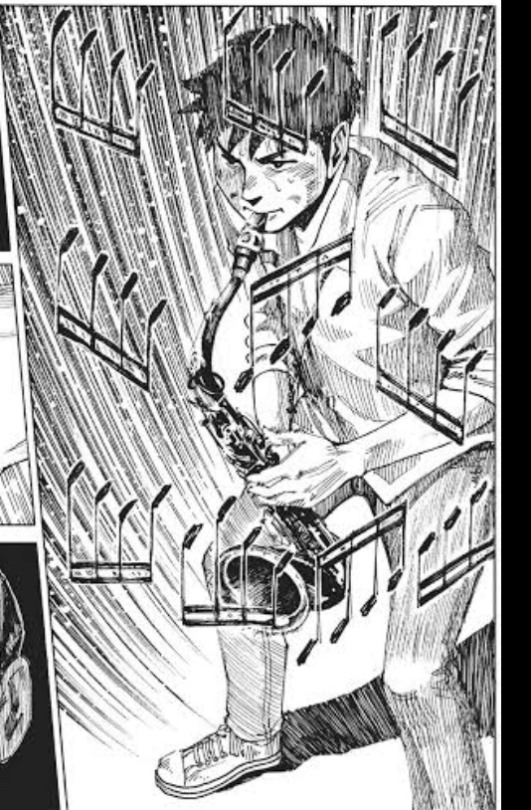

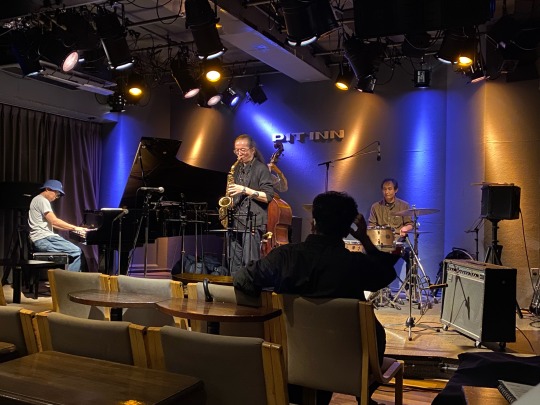
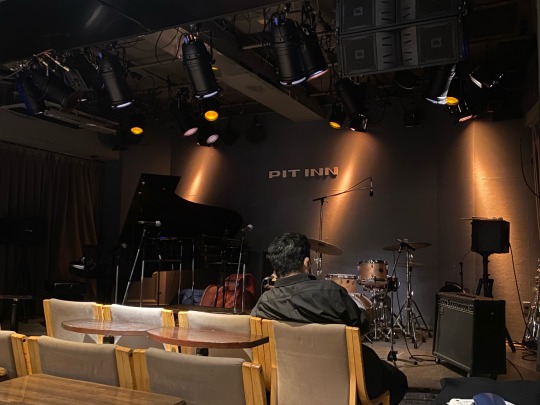
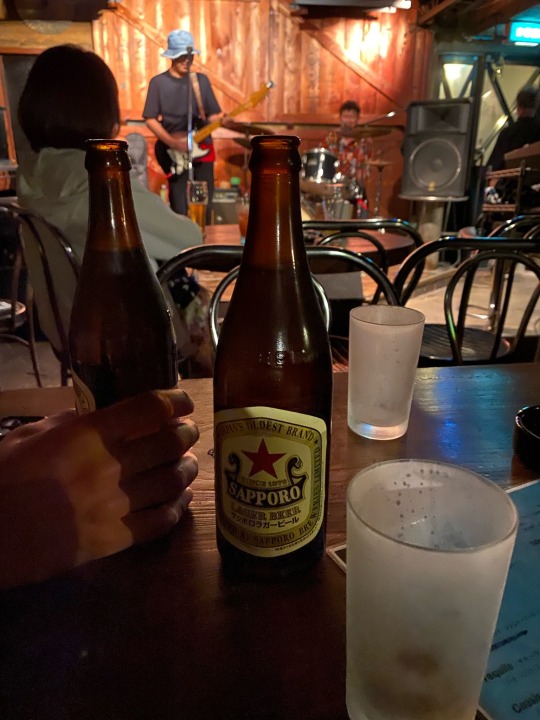
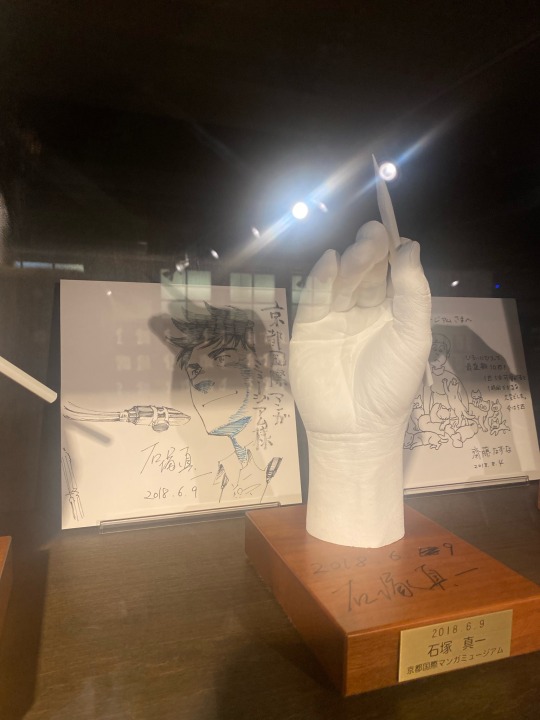
1 note
·
View note
Text

Amateur built 2019 Cub Crafters Carbon Cub FX-3 at the Ken Jernstedt Airfield Fly-In, Oregon
#Cub Crafters#Carbon Cub#FX-3#Kit plane#Bush plane#amateur built aircraft#plane#home built aircraft#airplane#flying#4S2#Plane pictures
20 notes
·
View notes
Text
Foundation:

A foundation is just that: the founding in which a project can be built.
My foundation is storytelling.
To tell a story is to:
Comprehend and process the info in said story
Consider it worthy enough to take space in this plane, and
Commit to the materialization or memorialization of said story
Our Greatest Project is ourselves.
Our Lives ARE the Journey.
& Our Journey lies within our Story.
Here is mine.
.
.
.
.
.
*First post in 2022 for this blog & pic from 2022
The rest is in chronological besides pinned post explaining Journey and blog layout*
#cassidyreturns#my blog#my journal#my journey#my story#spiritual journey#holistic healing#healing journal#healing journey#self healing#tantra#storytelling#storyteller#personal blog#healing blog#self healer#self empowerment#amateur model#amatuer photography#self reflection#self realization#self love#self love journal#self love journey#personal#radical self love#radical self acceptance#radical self care#my diary#healing
1 note
·
View note
Text
Read a soldier's account of war and fear is an ever present. Be it Peter White's With The Jocks, where his almost every move is preceded by the fear of the unknown German, and where an unnamed Scottish infantryman compares the night before an attack to that of a condemned man - the difference being that a condemned man lives the experience but once. Or in George MacDonald Fraser's Quartered Safe Out Here where the author describes standing alone in front of three bunkers, his sweat turning to ice.
These are obvious examples of fear in war, but it manifests in different ways. One is obsession with the enemy's equipment. In With The Jocks, every German artillery piece, every shell, is automatically referred to as an '88' after the famous anti-aircraft gun that the Germans also used as an anti-tank gun. It had been used to devastating effect against British tanks in the deserts of North Africa and entered into the obsessions and fears of the British. And so, White calls everything an 88, no matter that they had been far less effective in Normandy than Libya.
Or there's the famous Tiger tank. Every German tank was a Tiger to the men on the other side. It's gun could destroy the Allied tanks it opposed at 3 or 4 times the distance the guns of Allied tanks could penetrate it's armour. It didn't matter that in Normandy in 1944 there were never more than 80 or 90 Tigers in service at any given moment, or that tank-versus-tank combat accounted for approximately 6% of the shells fired by British tanks. The fear of being trapped in a burning tank, at the mercy of a big cat was there. And it has remained ever since.
Wars are won by stuff. Having more guns and tanks and planes, in the right place, and keeping them supplied and operational. If you want to go really wild, you can say that there were no decisive battles in the Second World War - that is to say no engagements that fundamentally changed the outcome. It's why there's a famous maxim that amateurs study tactics, professionals study logistics. It's why Eisenhower listed the Jeep and the Dakota in his list of things that won the war.
To digress, this has been in evidence for nearly a year in Ukraine, where an ostensibly much more powerful Russian military has struggled to keep it's forces supplied and reinforced in the face of a smartly organised and led Ukrainian defence. For politicians in general, and autocrats in particular, military spending is best used on big, prestige projects like aircraft carriers, or tanks, or fighter jets. Not much in the way of cool photo ops to be had beside cargo planes, no matter how essential they are.
The Allies understood. Their tanks were reliable, easily fixed and maintained. They were transportable. Sherman tanks, made in Michigan had to be moved by rail, loaded into ships and moved thousands of miles. They could drive over a Bailey Bridge (secretly one of the greatest innovations and solutions of the war). In the final months of the war, the US introduced the Pershing and the British the Centurion, the first battle tanks of the Cold War, modern, balanced, powerful tanks, but with earlier designs the Allies prioritised the logistical, operational aspects of their tank designs at the expense of protection and weaponry.
The Germans did not make such compromises. The Tiger was a massively inefficient, fuel-hungry beast built by a nation that was chronically short of oil. It was heavy - too heavy for most bridges and roads - and so it had to be transported by rail. Only it was too wide for rolling stock, so the tracks had to be taken off and replaced with narrower ones for travel. The later model Koenigstiger used the same engine, but were tons heavier and thus much, much slower. Many examples of the preposterous Jagdtiger self-propelled gun were destroyed by their own crews after they broke down or ran out of petrol.
A fearsome weapon on the battlefield, but expensive and unreliable off it, the Tiger was a massive headache and there were never enough of them available. Of all it's variants, the Germans made about two thousand vehicles. The Americans made forty thousand Shermans. The Soviets another forty thousand T-34s. The Wehrmacht remained largely horse-drawn in the final year of the war, while Allied forces were fully motorised, long convoys of truck and planes keeping their forces supplied and organised when and where the Germans could not.
But the Tiger lives on in the imagination, because of the fear it generated among Allied soldiers. Because logistics and reliability and big-picture thinking mean fuck all to a man in a tank about to break cover and who knows that if he's in the wrong place at the wrong time, the 88mm shell from a Tiger will kill him long before he gets any opportunity to return fire.
#ww2#wwii#war is fucking awful#however bad you've imagined war to be it is much much worse#the Germans did it too. They feared Allied airpower like nothing else
0 notes
Note
Please tell us more about ur eldritch interwebs cause im intrigued now!
Okay so this is not a coherent thought, mind, it's not like I just have a solid packaged idea ready to go, but I feel very strongly that there are many things in nature that are bigger than us. Things like the sea and sky or the flat plane of the earth. But 'bigger than us' doesn't mean that it's not connected to us or we can't experience it- think about the sheer amount of complexity and wonder inside the human nervous system. That's bigger than us! We don't fully understand our bodily systems, can't replicate them, but they literally live inside of us.
The internet is not something we built with a grand, unified vision, and it's not something we're maintaining with a grand unified vision. In real time we're forgetting, rendering obsolete, losing parts of our history at the same time we're coming to an unprecedented phase of ease of communication.
We're unleashing a vast liminal space with contradictory objectives and many people are enthusiastically teaching and constructing it to harvest data on people, as a way to control others. And this is just me kibitzing from an amateur perspective- I'm by no means an expert on the subject, I just use the internet for a lot. There's so much about it we don't know and understand.
To tie back to what started this, what I liked about the .hack series (even though it was also kind of what pulled me away from it, considering I was very confused about the series and what order they went in and what was even going on) was how much it was like, "yay here's our innocent video game world! it's okay if you die here because it's just fake and your real body will wake up!" and then someone experiences basically digital sleep paralysis or spends so long in the game they forget who they originally were. The game has events and special items and moderators but there's deep questions as to what mind is possibly controlling things. Someone's character is deleted in an unusual manner and she might as well be dead; we just don't know what happened to the "real her". It's a digital masquerade and ostensibly none of this affects the real people, but is that the case?
Even without any form of immersive VR, playing games with first-person perspective always creeps me out, because if something attacks the screen, it feels like it's personally after me, not my avatar.
There's a lot of room for digital horror is my point I guess, and the topic is so unsettling that a lot of concepts that just try to play it straight and never ask those questions end up unnerving me more rather than less.
51 notes
·
View notes
Text
@cthene @squeeto and @failedintsave have written three distinct flavors of Skwistok Apocalypse Fic and they all live in my head rent free so I felt like doing a lil end-of-the-world scene. (If a modified version of this pops up in the Stay Alive sequel that doesn’t exist shh shh shh shut up ❤️)
The bunker didn’t offer much in the way of creature comforts. A holdover from the Cold War, it was 1500 square feet of steel buried beneath four stories of cement. There were suggestions it had been built for a group, but there was only one bed—a twin cot that only Pickles could fit on comfortably, though Toki made due if he tucked in his knees. The bar and the armory were fully stocked. A connection to the outside world was available via a 360-degree live feed of the surface, visible from a claustrophobic surveillance room. It wasn’t impenetrable, but it was a lucky find. And until they received marching orders from Offdensen, it was home.
The only spray of color amongst the sterility was a faded, amateur mural canvasing the entirety of the southwest wall. A panorama of the snowy, mountainous Montana landscape. The proportions are all out of wack: Distant trees and prominent foreground boulders seem to have the same weight and dimension. Toki sits on the floor opposite it, eyes fixed on the blobby bug-eyed buffalo grazing the sorta serene-ish tableau. He thinks of the person who painted this. How they were probably really proud of it. How making it probably brought them some form of peace. How they were long dead. The despair makes him nauseous.
Skwisgaar is curled in the space between Toki’s legs, head resting on his chest, arms wound lightly around his waist. They all agreed to take turns “keeping watch” in the surveillance room. But everyone was on-edge, everyone was scared, everyone was a little too focused on their own anxiety to notice how deftly Skwisgaar switched shifts. His impulse to assuage the others often tipped into the unhealthy territory but in the last few weeks it had made a full tilt into self-destruction. He’d been holed up in that room, delirious with sleep deprivation, for almost two days days before Toki caught on. He was only convinced to leave when Toki started crying. (He’s not proud of that tactic, but hey, it’s the end of the world. Lots of people are doing lots of things they’re not proud of.)
As he idly plays with the ends of Skwisgaar’s hair, Toki hears the echo of footfalls drawing near. They’re so swift, so light, Toki knows exactly who it is well before the worn sneakers appear in his periphery.
“Hey,” Pickles says.
“Heys,” Toki answers.
A half-empty handle of vodka dangles from Pickles’s fingers. He tips his chin at Skwisgaar’s sleeping form. “Why doncha take th’bed?”
“Nathan’s using its.”
Pickles nods and takes a long pull from his drink. A beat passes.
“…That buffahlo is pretty fucked up, huh?”
“I can’ts stops looking at its.”
“I’ve never SEEN a buffahlo in real life but I’m,” he pauses, squinting to calculate, “73 percent sure they don’ look like that.”
“Onlys 73 per-cents?”
Pickles shrugs. “I mean, hey, maybe buffahlos look exactly like that, I dunno whut I dunno.”
Toki’s silent laughter shakes him. But then a muffled moan vibrates against his collarbone.
“Toki?” He murmurs, sluggishly starting to rise.
He code-switches on instinct. To answer in English, with an audience, is too raw.
“Jeg er her.” He cups the base of Skwisgaar’s skull and guides him back to his chest. “Gå tilbake til sengs.”
Skwisgaar’s hold tightens. “Lämna mig inte.”
“Aldri, elskede.”
He settles against him and sighs. “Tack, älskling.”
Skwisgaar’s weight sinks into him, and after a few moments his muscles relax as his breathing falls into a slow, even rhythm. Again, it is quiet.
“Whut does it mean?”
Oh right Pickles is here.
“Whats?”
“Th’ e word and th’ a word you guys use fer each other.”
Toki freezes.
“At least I think they start wit’ an e and an a, I can’t be bothered t’ look up th’ spellin’ in that elven language a’yours.” He smiles crookedly but his eyes glass over. “That and we’re 40 feet underground and th’ internet doesn’t exist anymore.”
“You’ve heards us says dat?”
“Dood ya do it all’a time. I may naht know what yer sayin’ but I’m pretty good at pickin’ up patterns.”
He taps out an invisible rim shot, hissing the cymbal crash as he winks.
Toki briefly considers lying. But he knows it’s a waste—Pickles is primed to hacksaw through all his bullshit.
“It don’ts...translates, exactly, into English.” He waits a moment to see if Pickles accepts this as an adequate explanation. He doesn’t. Toki continues shakily: “Wells, it does but nots, um, de emotion…” He scrunches his nose and starts over. “Yous don’ts use it for everybodies, yous supposed to saves it for somebody who’s really…” Sighing, he thumbs Skwisgaar’s shoulderblade like it’s a lucky talisman. “I don’ts know whens we starts doesing it.”
“A while ago, dood.”
Oh.
“Oh. Um. Wells.” Heat rises to his cheeks. “Elskede in Norweigian means,” he winces, “beloved, and älskling ams kinds of de ex-quibbi-kent in Swedish buts it means, uh.” He tucks his chin to his chest and shields his eyes in embarrassment. “It means darling buts you don’ts use its de way you does ins English, it’s, um...”
His thumb and middle and index finger squeeze into his eye sockets so hard stars flash across his vision.
“...It’s somet’ings you use for de poirson what ams most specials to yous, likes de poirson you mights maybe marry one days wowee saysing all dis outs loud makes me feel real stupids cans I please stops?”
“Okey okey.” When Toki opens his eyes he sees Pickles waving his hands like he’s trying to break up a bad smell. “Asked an’ answered.”
The tips of Toki’s ears burn, a shameful sludge spreading thickly behind his sternum. He tips his head back, skull thunking dully against the wall.
“Don’ts tell de guys abouts dis, Skwisgaar will nevers forgive mes.”
“Nah, dood, don’ worry, this stays in th’ vault.”
The drone of the overhead fluorescent lights and the muted thrum of generators thrums like locusts. Skwisgaar inhales deeply, exhales sharply, and nestles closer. Toki’s gaze darts about the terrible mural, searching for something to latch to, but his focus swings as if by gravitational pull back to Pickles’s face. When he at last resolves to glance up at him, he’s braced for ridicule. But when he does, his tension deflates. Pickles doesn’t look like he’s about to make fun of him. Pickles looks like...Toki doesn’t know what Pickles looks like.
“Whats dat face?”
Pickles’s smile widens, head cocking to the side.
“Stops dat! What’s dat face!”
“What face! There’s no face! I don’ even have a face!” He bites his lower lip, muffling a chuckle. “Awright bud, I’m naht gunna lie, me and these other dooshbeegs have had our suspicions about the, errrr aaaah...”
He cinches one eye shut.
“...Nature of yer relationship. But none’a us suspected you guys were, y’know…”
He rolls the wrist holding the vodka, liquid splashing to the floor. Toki stares at him questioningly.
“...Fully in it.”
Toki blinks. “In whats?”
Pickles pinches his lips and squints as if to say, come on dude, but doesn’t press further.
“Welp.” He kicks backwards to push himself off the wall and stand upright. “It’s almost sunrise. Or sunset, I dunno, this steel box has really fucked up my internal clahck. But I’m gonna watch th’ sun do somethin’ wit’ Murderface until my shift on watch.” He pivots to face the long corridor leading to the surveillance room. I’ll see ya around.”
He pauses. He points a finger in the air, draws a small circle, and glances over his shoulder with a small smile.
“Abviously.”
He’s gone as quickly as he arrived.
Toki’s attention returns to the mural. The staticky grasslands. The angular mountains. The flat plane of the lake. Toki’s not an art guy but he knows this is bad. Still, it moves him. He doesn’t understand why. Maybe he doesn’t have to.
He and Skwisgaar have always talked around it. They’ve always had an understanding, leaving little secrets and codes for the other to crack. They did, mostly. It’s the same, mostly. But it’s the end of the world and Toki needs to say it out loud.
He buries his face in that soft golden crown and whispers, “I loves you.”
“I loves you, too,” is the sleepy reply.
He was wrong. It’s different. It’s better.
“Is likes Pickle says.” He pushes himself up to press his lips to Toki’s neck. “We’s fully ins it.”
32 notes
·
View notes
Note
If anyone is an enabling mood..HI, I AM ALWAYS IN AN ENABLING MOOD, YOU WANT ENABLING? HERE IT IS. I have soft loving enabling tho cos I don't like being mean it makes me sad.
As we all expected, I am very, very easy to enable. Credit to @voidxces for the beautiful and inspiring edit. Mildly smutty bits, hence the full story is below the cut.
Valletta, Malta
December 15, 1999
The customs line at Malta International Airport is long, maddeningly slow-moving, and the one guard stamping passports looks to be about ninety, as Joe shifts from foot to foot and tries to remind himself that they have nothing but time. (Unless, of course, the Y2K nuts are all correct and they’re two short weeks from the end of life as we know it, but if nothing else, living for almost a thousand years means that he has seen countless doomsday prophecies come and go without so much as a whimper.) It was a crappy flight from Paris – overbooked, understaffed, the inevitable screaming child two rows behind them and now determined to keep up the racket in the passport queue – and Joe’s trying not to look as stressed as he feels. This is their getaway for the holidays and the new year, the turn of the millennium, a huge and significant milestone for any number of reasons, and he’ll feel better once they’re out of here. Nobody’s at their best in the cattle corrals and the fluorescent lights of border control, another reminder of how much things have changed over all the years they’ve been coming to Malta. The first time they were here in 1501, all they had to do was sail up, get off the boat, and pay a bribe to the port official. Joe votes they try that now.
The line shuffles forward another inch, the child behind them screams even louder, and as Joe is silently reciting the Bismillah and reminding himself that the Almighty values patience, Nicky turns around. He sizes up the mother – tired-looking, hungry-eyed, apologetically trying to corral the fussy baby and a toddler of about three or four – and smiles gently. “Hello,” he says in English, then glances at her passport and sees that she’s Italian. “Buona sera, signora,” he goes on, not missing a beat. “Hai bisogna di aiuto con qualcosa?”
The tired mother starts, her eyes welling with tears. Joe’s willing to bet that nobody has offered to help her for this entire trip, and has to smile softly to himself that of course Nicky has swooped out of the Maltese night like, well, a knight, her countryman in a time of crisis, to do exactly that. Joe is already feeling better just to watch Nicky be Nicky, as his lover takes hold of the baby, joggles him on his hip and tells him that he’s a handsome fellow and to stop screaming and to give his mama a break, as the mother tends to her toddler, gets herself sorted out, and thanks Nicky profusely in what sounds like Calabrian. Joe’s mostly able to pick out the specific regional accents, and he guesses that this woman is a migrant, one of the workers who travel around Europe in the growing season to pick fruit and vegetables in hot fields under hard bosses who only pay in cash and owe a cut to the Mafia. He takes out his wallet and quietly offers her all the Maltese lira they changed for back in France, and she shakes her head and tries to refuse. He insists – she looks somewhat surprised that he speaks Italian too, but not unduly – and while she won’t take it all, they manage to give her back her baby, some money, and reach the front of the line without actually noticing the rest of the wait. Joe hands over a French passport that reads Joseph Jones. Nicky hands over Nicholas Smith. The guard looks at them, asks a few questions in his quavering old-man voice, stamps the visa pages, and once more, they’re in.
Outside, Joe and Nicky collect their bags, help the woman to the taxi rank and make sure she’s on her way to wherever she’s staying, then go out to catch the bus. Valletta sparkles in the distance as they draw closer, this magnificent collection of fortresses and gardens and churches, domes and spires, palaces and piazzas, museums and terraces, city walls and citadels, Benjamin Disraeli’s city of palaces for gentlemen. The place was largely built by the Knights Hospitaller after their exile from Rhodes and the Great Siege of Malta in 1565, and Joe and Nicky have watched it transform over the centuries, but it has still managed to retain that unique spark of what they love about it. It is familiar, comforting, lovely. If the world is going to end, no better place to be than here.
The bus stops in downtown, they thank the driver in fluent Maltese, and get off, hauling their bags and suitcases. The December evening is cool and misty, fog floating over the cobblestones like elegant wraiths, the streetlamps casting pools of golden glow that look like doorways to another world. They walk casually hand in hand to a corner store that is about to shut up shop for the evening, buy a quick dinner, and then continue up the street. Somewhat appropriately, they are staying in a rented house near St Sebastian’s Bastion, Is-Sur ta' San Bastjan, on the northeastern tip of the Valletta peninsula near Fort Saint Elmo. They know the elderly owner well, who has left the key in the postbox for them, and they unlock the door, ascend the narrow, creaky stairs to the top-floor garret, and find that a small Christmas tree and a plate of imqaret have been left to welcome them. The windows open out over the city wall and the dark, glittering ocean. It is quiet, at last. Just the two of them.
“Finally,” Joe says. He picks up Nicky’s bags when he puts them down, and carries them into the dark bedroom, switching on the lights. They set down their convenience-store repast and eat, affectionately nudging each other’s knees under the too-small table. They’ll do more shopping tomorrow; they will be here at least until January (assuming, of course, no apocalypse). Joe smiles at Nicky, happy to be here, happy to be with him, happy to be sharing this small and unremarkable meal with a soft rain pattering on the steep slanted roof. When they’ve finished and tidied up, Joe murmurs, “Not too tired, are you?”
Nicky answers with a devilish quirk of his eyebrow, as if to say that of course neither of them were actually planning to go to sleep without celebrating their return appropriately. He wraps his arms around Joe’s waist, and they waltz into the bedroom, kicking the door shut behind them and drawing the curtains, sinking down on the amply-sized bed and undressing each other with slow and leisurely care. Even after a thousand, a hundred thousand times, it never fails to thrill. Their mouths meet in the dimness, their hands trace the well-loved lines of the other’s body, the faint scars and lines that never go away even through all the regenerations, the secret places, the curve of lips, the plane of shoulders and spines, the tensed tightness low on stomachs, the bend of a knee or the bone of an ankle. Joe pushes Nicky down beneath him, and Nicky arches his back, wrapping his legs around Joe’s waist. In quiet and tender and timeless communion, they find their way back home again, in each other and with each other, in touches and kisses and slow thrusts turning faster, and finally, sated, they sleep.
They wake in the morning with slants of winter sunlight filling the room, the high white ceilings, the gauzy curtains fluttering in the constant draft that they’ve never found, the way they’ve woken up in this room since they first met the owner in 1973, and which makes Joe think poignantly, as he always does for just an instant, of their lost home in Constantinople. They get up and dress, then leave the house in search of breakfast. The stone of the streets is pink and amber and gold and fawn, and the light has that particular early-morning quality where it seems to shine through sheets of bleached linen. The city is already awake and bustling, and Joe and Nicky make their way to their favorite café. They can sit overlooking the water and eat as much pastry and drink as much coffee as they like, and they make a good several hours of it. The sun comes up over the street, the palm trees rustle in the breeze, and a few tourists wander by with fancy Nikons around their necks, looking lost. One asks in English if they know where the Grandmaster’s Palace is, and Nicky is happy to point them in the right direction.
“You know,” he says, when they have finally finished breakfast and are wandering happily through the baroque streets, hands and shoulders brushing, “it’s 1999. This is our nine-hundredth anniversary, strictly speaking.”
Joe raises an eyebrow at him. “More like our eight hundredth,” he says playfully. “If we’re going from when we actually figured anything out.”
Nicky shrugs, grinning sheepishly, even as both of them fall contemplatively silent. 1099 is a long, long time ago by anybody’s measure. Joe thinks of himself, kneeling in prayer in the Tower of David, the dread whispers that the Franks were coming, the way he can remember parts and pieces and that first death bright as flame, but the rest of it has faded into the soft greyness of endlessly passing time. They did go to Jerusalem earlier this year, in July, since it seemed like the thing to do; there were a lot of First Crusade remembrances going on, some of which they wanted to be associated with and some of which they didn’t. There was a tweed-jacketed history professor who was deeply appreciative of the detailed account that Nicky was able to give on the breach of Jerusalem’s walls (he asked if he had published any articles on the subject, Nicky said hastily that he was just an enthusiastic amateur), and then there were some whackjobs who were trying to inflame religious tensions, as usual, and basically acting like it was a good thing that the heretics got what was coming to them. Lots of Americans with placards. Lots of Israeli secret service and bearded guys who were probably covert Hezbollah. Lots of people who all think they know exactly what the crusade’s legacy means, and which Joe and Nicky couldn’t help but regard warily. Everything seems twisted up these days, poised on the brink. That guy named bin Laden whose pals tried to bomb the World Trade Center in 1993, he’s been talking as usual. Death to the Western crusaders. So on and so forth. Thus far, nobody’s really listening outside the Middle East, but when you’ve seen this so many times, it’s harder to ignore.
Joe shakes himself, not wanting to think about this on their long-awaited getaway. They’ve been in Kosovo on and off this year, even if the last thing any of them really wanted was to go back into the Yugoslavian wars, and Andy and Booker are off to enjoy the last few weeks of the twentieth century elsewhere. Someone like Andy, the turn of a millennium is old hat, but even for as long as they’ve lived, this is Joe and Nicky’s first new set of a thousand years. The Year Two Thousand. Sounds appropriately science-fictiony. How, Joe thinks. How on earth did Yusuf al-Kaysani from Cairo end up here.
That, however, is only incidental to his enjoyment of the rest of the day. They walk on the city walls, they go up to the Grand Harbor and take in the sea view, then to the Barrakka Gardens. Nicky gazes pensively on the monument of remembrance and out over the glittering blue water, as Joe sits down on a bench and watches him. He has always simply enjoyed looking at Nicky, watching him breathe, watching him be, watching the way he leans on the railing and shields his eyes against the sun with the casual, unconsciousness elegance that permeates everything he does. Whether the name is Yusuf al-Kaysani or Joseph Jones or anything else, it doesn’t matter. Even among all the change and clutter of the modern world, this adoration, this soul-deep delight, is the one thing that remains constant.
That is how the next several days pass. Joe and Nicky visit their usual old haunts in Valletta, eat well, make love, and catch up with the apartment’s owner, Ġużepp, who is now in his eighties, has known them for over twenty-five years, and never seen them age a day. He has never asked why. His wife died a long time ago and they never had children, and perhaps he sees them as sons, as a strange but poignant blessing for a lonely old man, two people who clearly love this place as much as he does. He asked them once when they first came here, and Joe wondered if they should just tell him that it was the sixteenth century. Somehow it seems as if Ġużepp might not be surprised.
A few days before Christmas, a storm blows in from the Atlantic just as dust blows in from North Africa, and the world turns silver and ocher and rust and wet, the windows sparkling as if stained in silver nitrate and the streets and domes and splendid churches of Valletta painted in watercolor impressionism on the blurry glass, anything or anyone outside the bedroom barely seeming to exist. Joe and Nicky spend the time productively, which is to say they have so much sex that they can barely walk. They twist into each other, explore and challenge and unstring and repair each other, touch and caress, kiss and lick and suck and mark their territory all over again, leaving no inch of flesh unexplored and no sinful act undone. “You know,” Nicky murmurs, eyes closed, smiling, sweat beading on his brow, hand stroking up the line of Joe’s spine as Joe nips at his neck. “We really are a pair of heretics, aren’t we.”
“Speak for yourself, Nicolò.” Joe leans down to steal another kiss from his lover’s bruised, teeth-marked lips. “Heretics according to who?”
Nicky hums, as if to say he is happy to get into a theological argument at a later date, but can’t be arsed to do so right now. Joe slides down next to him, sliding his hand across Nicky’s chest and stomach, curling lower, as Nicky whines and reflexively tries to pull back. “You’re going to be the death of me.”
Joe laughs, as he always does, pressing a kiss into Nicky’s shoulder and thinking – as he also always does – Allah and all His angels forbid. He has always secretly, shamefully prayed that if that terrible moment came, if one of them lost their immortality first, that it be him. He knows this condemns Nicky to live on without him, but he cannot face the prospect of doing it himself. Dying for good, even after this long, somehow seems easier. At least he’s done that before, often. Living without the other half of his soul, not so much.
The rain clears on Christmas Day, the light is fragile and golden and perfect as heaven, and they call Andy and Booker (Andy’s somewhere in Argentina, Booker is on a beach in Thailand) and wish each other happy holidays. Nicky mixes up a feast, Joe helps (if by that you mean stirring the occasional pot and taking full advantage of Nicky’s “Kiss the Cook” apron) and they open their door and visit with the neighbors who drop in to bring more pastries and Christmas wishes. Ġużepp turns up, they invite him to stay for supper so he won’t be alone, and after the token protests, he agrees. As he is insisting on doing the washing-up, he asks, “How long have you two known each other?”
Joe and Nicky glance at each other. They’re fairly sure that Ġużepp knows they’re a couple, even if they haven’t said so openly, just in case an old Maltese Roman Catholic would prefer to know it implicitly but not have it confirmed. Finally Nicky says, “A very long time.”
“I thought so, somehow.” The old man reaches for a dish towel. “You seem that way. Have you been happy here? All the times you’ve been to Malta, to my house?”
“We’ve been very happy,” Joe assures him. “This place has been special for – for many years. I am Arabic, Nicky is Italian, it is like it was made just for us.”
Ġużepp smiles. “Your families?” he asks. “They are happy with it?”
Joe thinks of his mother, far off and so very long ago, and how Maryam al-Katibi always wanted him to be a better man. How he forgot about time and its passing, and never saw her again after he left. It remains one of the greatest regrets of his life that she never met Nicolò, as he thinks that they would have liked each other very much. But as far as their family goes now –
“Yes,” he says, thinking of Andy and Booker. “Yes, they are.”
“I am glad,” Ġużepp says stoutly. “It is good for a man not to be alone.”
(It is, and both Joe and Nicky have clung to that, and they don’t know now that this is the last time they will see Ġużepp, as he will die before they return here in 2004 when Malta becomes a member of the EU, but on this sweet, poignant night, as time speeds on its passing, as they both reflect on all those many years, and God said that it was good.)
The last week of 1999 and the twentieth century and the second millennium count down to its inevitable end. There aren’t exactly prophets in sandwich boards shrieking on the streets about the end times, though it’s undeniable that there’s a sharp-edged anxiety as Y2K draws closer. On December 31, Joe and Nicky sit on the beach at the famous Blue Lagoon, watching the sun go down over the island of Comino, holding hands. At last Nicky says – half joking, but only half – “If the world does end tonight, I want you to know that you are still the best thing that ever happened to me. Except for that pastry the other day. That was really very divine.”
Joe laughs, takes his hand to his lips and kisses it. “Always, my heart,” he says. “Always.”
The world gets softer and darker, and lights come on over the bay and the archipelago and the boats bobbing at anchor, and Joe thinks that it must be the year 2000 somewhere else, and everything still seems to be fine. He wasn’t really worried, but he knows that fear that the next year might bring with it something too terrible to be gotten around, and that if you could just cling to this moment now when things are all right, they might stay that way forever. Finally he and Nicky get the water taxi back to Valletta, and it’s getting closer and closer to midnight, and they sit down on a bench and count down with the rest of this sliver of the world, all the way into the next stage of forever.
When it becomes plain that the world has not ended, nor indeed does it seem likely to do so, everywhere seems to let out its breath at once. Huge and glorious fireworks thunder in the dark sky over the city, in riots of color and noise and sound, and Joe and Nicky can hear cheering and toasting from what seems like every house in the city. They kiss and then kiss again for good measure, swept along on a tide of jolly and relieved and mildly (or well, considerably) inebriated strangers, an impromptu street party that both of them feel down to their nine-hundred-and-fifty-year-old sinews, the sort of magic that still catches them dead to rights even after so long in this beautiful, stupid, dangerous, exasperating, maddening, heartbreaking, filthy, glorious, transcendent, irreplaceable world. They throw their arms around each other’s necks and gaze deeply into the other’s eyes, as even all the gaiety and festivity and bacchanal falls into nothing, passing over them like waves. “I love you,” Joe says, as he has said it so many times in all the languages he knows. “Ti amo.”
Nicky smiles that smile that makes the world shine, and spins Joe lightly on the spot, and the next thousand years seem, just then, like the greatest blessing that any man has ever had. “I know.”
#the old guard#the old guard fanfiction#joe x nicky#kaysanova#that time in malta#coffeemakesmeahappybean#ask
204 notes
·
View notes